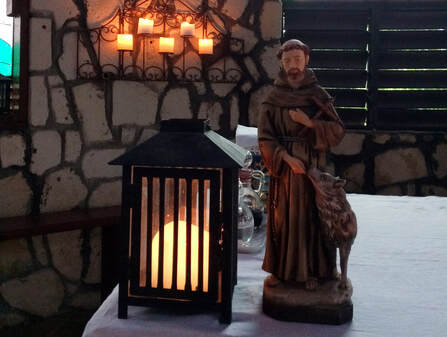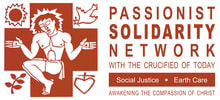|
Solidarity news and reflections of interest to the Passionist Family Yet, there are other “hurricanes” that are of greater concern to me. My thoughts go to Charlottesville, Myanmar, Las Vegas and Haiti where the violence has begun again, and for apparently different reasons in each locations. How should we respond to the violence that surrounds us?  Last year on this very day, the Feast Day of St. Francis, Hurricane Matthew began to slam into the southwestern part of Haiti. I remember the winds blowing fiercely that morning and before Mass I decided to put a statue that I bought in Assisi on the altar. The statue is very unique, and depicts St. Francis taming the wolf of Gubbio ( a small town not far from Assisi). When I purchased it, I never could have imagined using the statue for a Hurricane. I bought it on a visit to Assisi with Raphael, as a sign and reminder to us that good will never prevail over evil and that, as St. Francis himself said: "all the darkness in the world cannot extinguish the light of a single candle". My thoughts were focused on wishing for peace in Haiti. The story of the saint and the wolf is that the wolf terrorized the inhabitants of the small Italian town. The wolf not only killed and devoured livestock but it began to attack the people. All attempts to kill the wolf failed and fear took over their hearts. St. Francis heard of this and decided to confront the wolf. The huge wolf rushed toward Francis to attack but he made the sign of the cross, called the wolf “brother” and commanded him in the name of God to stop terrorizing the town. Download PDF of this post
“Brother Wolf,” said Francis, “I want to make peace between you and the people of Gubbio. They will harm you no more and you must no longer harm them. All past wrongs are to be forgiven.” Immediately, the wolf became docile before the saint. Francis went on to condemn the wolf for his attacks said that if he ended his attacks he would convince the inhabitants of Gubbio to provide him with the food he needed. The story goes that the wolf placed his paw in Francis’ hand in agreement. Then Francis invited the wolf to follow him into town to make a peace pact to the astonishment of the inhabitants and there reiterated the promise. I will never forget that day in Haiti, with the hurricane bearing down on us the roar of the winds, the darkness of the sky and the rain pouring like a waterfall. We had no options but to find a solid shelter and wait. The days before the arrival of Matthew we had prepared clothes, sheets, food and water ready to go out to assist those affected especially in the poor and remote areas. Right before the hurricane arrived, the streets were eerily quiet – no sound of a motorbike, or animals or human beings, and no honking car horns (if you have ever been in Haiti, it’s the constant sound on the streets!). The violence of the Hurricane was so strong that, when we were able to fly by helicopter over the afflicted areas and open the road that leads from Jeremie to Dame Marie, it looked as if a bomb had been dropped and destroyed everything. Those images are still so much alive in my memories and the consequences are still so alive today. There is a long way still to go in order to fully restore the agriculture, the roads, the homes, schools and churches. Today, a year after the hurricane, the area of St Victor where the Bishop of Jeremie had asked us for help can barely be reached by a 4x4 vehicle; in fact, most of the aid until now has been transported by barge to the closest beach. We use the little boats that we donated to the local community to transport the supplies from the barge to the shore, and then the Haitians carry all the supplies further inland on their heads! The recent images of the destruction caused by Hurricanes Irma and Maria, and the earthquakes in Mexico have brutally revived my memories of the vast devastation caused by Hurricane Matthew. We know that hurricanes take form and grow because of the warm ocean water plus the Earth's eastward rotation, and can be considered as heat engines. They take heat from the oceans and convert it to the energy of their winds. They take thermal energy and make mechanical energy out of it. Yet, there are other “hurricanes” that are of greater concern to me. My thoughts go to Charlottesville, Myanmar, Las Vegas and Haiti where the violence has begun again, and for apparently different reasons in each locations. How should we respond to the violence that surrounds us? By analogy I would like to ask what is the heat that “fuels” the verbal and physical violence of recent months? How can a society be so divided and angry in 2017? Who is “contaminating” the air and spreading violence like leopard spots? And what is the antidote for these deadly recurring “hurricanes”? am sure that the reasons can be many and that in our polarized world we risk identifying a problem with one side or the other. In times of chaos and crisis, we seek a quick resolution and we tend to start pointing fingers at where we think the sole guilty party lies. According to the scriptures, division never comes from the human or divine spirit - it’s always a deed of evil. Consider that “Devil” means “divider” and he actually was the most intelligent of all creatures. As a result, it’s evident that evil is intelligent and its purpose is to divide. Remember the beginning in the scriptures - the “snake” works to bring division at every level: from God, from our brothers and from creation. Christ then came into the world to “repair” those divisions. With Christ, God becomes man and shares our condition until death, and re-establishes communion with those cast out. He opens the gates of the garden again by rising from the dead, ascending into heaven, and sitting at the right hand of the Father with our humanity! As Paul the Apostle wrote: “For he himself is our peace, who has made the two groups one and has destroyed the barrier, the dividing wall of hostility, by setting aside in his flesh the law with its commands and regulations. His purpose was to create in himself one new humanity out of the two, thus making peace, and in one body to reconcile both of them to God through the cross, by which he put to death their hostility. He came and preached peace to you who were far away and peace to those who were near. For through him we both have access to the Father by one Spirit” (Ephesians 2:14-18). While the so-called “Third World” countries are now called “in development”, I think the entire world today needs a true culture of “development”. The pain, the violence, the suffering will not stop until there is true development towards peace. And that peace is a synthesis, albeit very simple, of various conditions. A bit like the sun's ray that the rainbow breaks into so many colors. Ultimately, two primary “colors” that make up the ray of peace are “development and solidarity”, as St John Paul II wrote in 1987 for the World’s Day of Peace. The development I’m proposing is not economic development, but rather a spiritual one. From a philological point of view it is not difficult to describe such "development". It is the uncoiling of something enveloped, indistinct, and confused. For example, developing an idea means to expand it, to clarify it, to articulate it, and to elaborate it aesthetically. Also, one could say that developing a film or a photo means making it visible, by means of suitable reagents, so that the hidden image becomes imprinted on the film. Thus, when we say that a component of peace is development, we are emphasizing that there is peace where the image of the person is brought to light, is returned to contemplation, is removed from the dark or is made clear in the harmony of colors. Just like what happened with the St. Francis and the “wolf”. To achieve peace, as St Francis did with the wolf, means to free the human being from the chains of misery, from the struggle of consumerism, from the grasp of those in power, from the involuntary seductions of false well-being. The situations of "non-peace" are essentially those in which a person remains an undeveloped negative without ever becoming a full-color photo. Another way to look at it is to consider that person as a flower that falls from the tree before it blossoms out into a fruit, left in the opacity of an indistinct thing which never finds the contours of a unique identity. But we must not confuse development with progress at any cost. Development is a journey in the direction of the human being; it is marked by the reference to the person as the absolute criterion of values. Progress, on the other hand, is a journey that does not necessarily follow the coordinates of the human being as the destination and can risk sacrificing the person for the sake of reaching the result (such as beating a rival or competitor). The supreme task that should guide every sign of progress is to bring the mark of development, on the face of every man on earth. As St John Paul II wrote in 1987 on World's day of Peace: "People are the subjects of true development, and the aim of true development is people. The integral development of people is the goal and measure of all development projects… People must be active agents, not passive recipients, in any true development process... It is not enough to reach out and help those in need. We must help them to discover the values which enable them to build a new life and to take their rightful place in society with dignity and justice. All people have the right to pursue and attain what is good and true. All have the right to choose those things that enhance life, and life in society is by no means morally neutral... Exploitation, threats, forced subjection, denials of opportunities by one sector of society to another are unacceptable and contradict the very notion of human solidarity… To deny the means of achieving development to any sector of a given society or to any nation can only lead to insecurity and social unrest. It breeds hatred and division and destroys the hope for peace. The solidarity that fosters integral development is that which protects and defends the legitimate freedom of every person and the rightful security of every nation. Without this freedom and security, the very conditions for development are missing. “ Only through the pursuit of development in the spirit of solidarity world-wide can we work to eliminate the ravaging “hurricanes” and the hungry and angry “wolves” that are plaguing the world today, and arrive at true peace.
0 Comments
Leave a Reply. |
Categories
All
|

 RSS Feed
RSS Feed